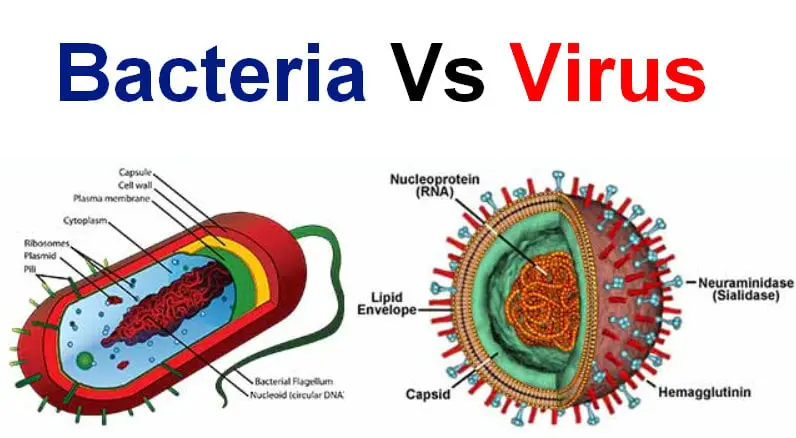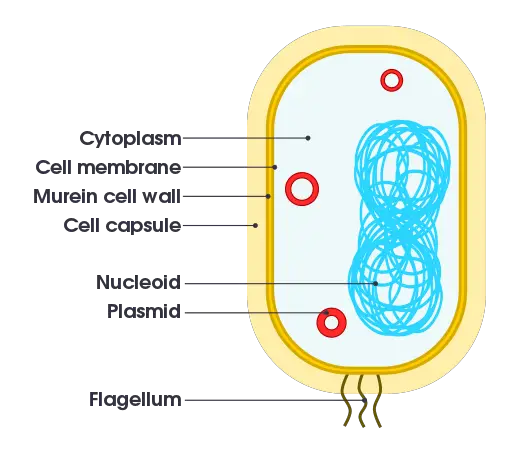Virus And Bacteria Similarities And Differences
Enzymes are always found in bacteria and in some viruses. Similarities in enzymes of virus and bacteria.
 Bacteria Viruses What Is The Difference Upc
Bacteria Viruses What Is The Difference Upc
When people fall ill the first thing that struck to their mind is about any contamination related to bacteria fungi or virus.

Virus and bacteria similarities and differences. Bacteria and viruses are microscopic microbes. They are both microscopic in size. Both virus and bacteria does not have nucleus.
Similarities in nucleus of virus and bacteria. They are living cells which can be either beneficial or harmful to other organisms. They both contain enzymes.
Their life therefore requires the hijacking of the biochemical activities of a living cell. Viruses vs bacteria in this article we will learn about the differences between viruses and bacteria well i want to teach you the difference between viruses and bacteria. Lack membrane bound organelles while bacteria have a few organelles involves in metabolism and reproduction they like viruses do not have membrane bound organelles.
Secondly bacteria reproduce by themselves through asexual method whereas virus needs a host cell to replicate as they lack cellular machinery but consist of dna and rna. They both cause diseases. In viruses the nucleic acid is not contained in a nucleus as is the case with eukaryotic cells.
This allows bacteria to live in many places. Whereas viruses are intracellular organisms they infiltrate the host cell and live inside the cell. Viruses and bacteria are both with microscopic size and special equipment is necessary to observe them.
Virulence is present in both bacteria and virus. Bacteria are intercellular organisms i e. Viruses and some bacteria cause diseases.
Similarities in disease of virus and bacteria. Viruses and bacteria are what we would describe as germs and these are the germs that we think about when we think about getting sick and people are often confused between bacteria and viruses but they re actually very. Although they have a number of differences bacteria and viruses have a number of similarities.
Bacteria are cellular organisms while viruses are acellular biological entities made up of proteins and nucleic acid. Both are never found together in viruses. Viruses are not living organisms bacteria are.
Similarities between bacteria and viruses. Viruses are another type of tiny microorganism although they re even smaller than. They both contain nucleic acid but do not have nucleus.
Bacteria on the other hand are living organisms that consist of single cell that can generate energy make its own food move and reproduce typically by binary fission. The biggest difference between viruses and bacteria is that viruses must have a living host like a plant or animal to multiply while most bacteria can grow on non living surfaces. Bacteria contain both dna and rna while viruses either contain dna or rna.
These bacteria are referred to as pathogenic bacteria. Only a handful of bacteria cause infections in humans. What is the main difference between virus and bacteria.
They live in between cells. Difference between flagella and pili. Viruses only grow and reproduce inside of the host cells they infect.
When found outside of these living cells viruses are dormant.
 Pin On Allied Health Prerequisite Microbiology
Pin On Allied Health Prerequisite Microbiology
 Do You Know Do You Know The Difference Between A Bacterial And A Viral Infection
Do You Know Do You Know The Difference Between A Bacterial And A Viral Infection
 Prokaryote Vs Eukaryote Intp Careers Intp Personality Intp
Prokaryote Vs Eukaryote Intp Careers Intp Personality Intp
 Bacteria Vs Viruses The Unit Of Microbiology In 2020 Microbiology Nursing School Survival Medical Knowledge
Bacteria Vs Viruses The Unit Of Microbiology In 2020 Microbiology Nursing School Survival Medical Knowledge
 Difference Between Bacteria And Virus Laboratoryinfo Com
Difference Between Bacteria And Virus Laboratoryinfo Com
 Difference Between Bacteria Viruses Protozoa Fungi Fun Science Fungi Medical Education
Difference Between Bacteria Viruses Protozoa Fungi Fun Science Fungi Medical Education
 Virus Vs Bacteria Differences Similarities In Size And Structure
Virus Vs Bacteria Differences Similarities In Size And Structure




Post a Comment for "Virus And Bacteria Similarities And Differences"